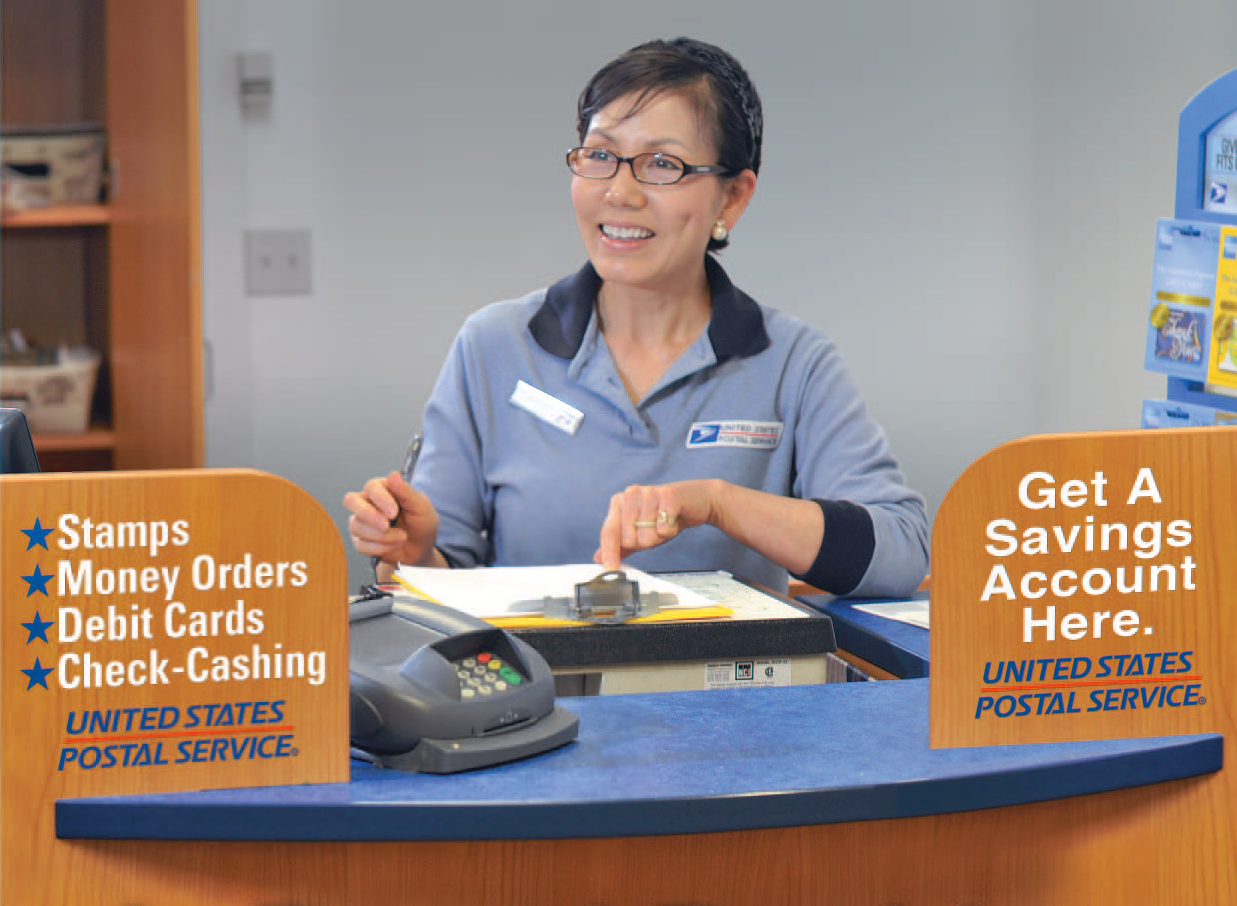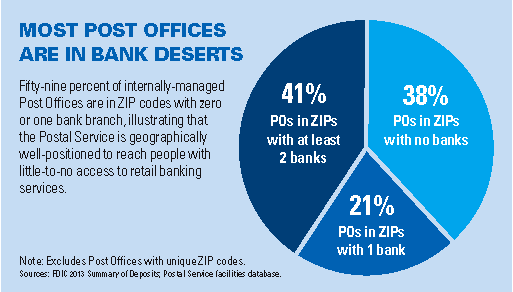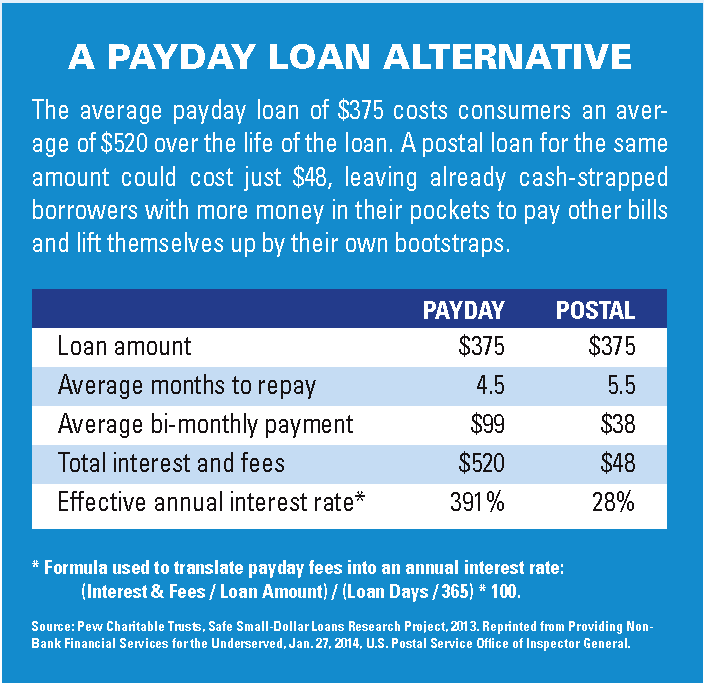Is Postal Banking an Idea Whose Time Has Come?
March 1, 2014
The USPS Office of Inspector General sparked quite a controversy when it published a white paper in late January that endorsed a concept postal unions have quietly supported for years: The Postal Service should provide basic financial services to the 68 million American adults who don't have bank accounts or who have limited access to bank services.

At his swearing-in ceremony last November, APWU President Mark Dimondstein championed the idea - although he expressed it very differently than the OIG ever would. "To protect our jobs, we must enhance postal services," Dimondstein told an audience of union members and friends. "Services such as basic, non-profit banking would be a great and real benefit to the people of this country, and a good answer to what I call 'the Wall Street Banksters,' who devastated the economy and with it the lives of millions of people."
The OIG paper was careful to say nothing that would offend bankers and emphasized that it was proposing a partnership that would be a "win-win" for the USPS and the banking industry.
Putting aside the difference in perspective and tone, who ever would have thought the APWU and the Office of Inspector General (OIG) would fundamentally agree on a policy matter of such importance? Although the APWU president has promoted the idea frequently since he took office (as have our brothers and sisters in the National Association of Letter Carriers), it didn't garner serious attention until the OIG recommended it as a way to solve the USPS financial crisis while serving an enormous public need.
Soon after publication of the OIG paper, Sen. Elizabeth Warren (D-MA), who serves on the Senate Banking Committee, posted a blog supporting the idea. "If the Postal Service offered basic banking services - nothing fancy, just basic bill paying, check cashing and small dollar loans - then it could provide affordable financial services for underserved families, and, at the same time, shore up its own financial footing," she wrote. Postal services in many other countries that offer such services have seen their earnings increase dramatically, Sen. Warren pointed out. Sen. Bernie Sanders (I-VT) also supports the concept.
Political Hurdles

Not surprisingly, Rep. Darrell Issa (R-CA), the wealthiest member of Congress and the author of bills that would go a long way toward dismantling the Postal Service, criticized the idea. "Gambling on a massive expansion of the USPS's mission to support unnecessary infrastructure is irresponsible," he told Fox News. "Rather than trying to find a new mission for an oversized agency, the goal should be to rightsize the agency to adjust to diminishing demand."
So, is this just another "good idea" destined for inaction because of congressional gridlock?
Maybe not: The OIG asserts that the USPS already has legal authority to get started.
But it won't be easy. The banking industry, which up to now has shown little or no interest in serving the unbanked, also rejected the idea of non-profit postal banking. Camden R. Fine, CEO of the Independent Community Bankers of America, called it "the worst idea since the Ford Edsel." And banks are among the Postal Service's biggest of the big mailers, and exert great influence on USPS policy.
Why It Makes Sense
Although it may seem somewhat far-fetched, the Post Office offered a Postal Saving System from 1911 to 1967, and continues to offer money orders to this day.
Today, the Postal Service remains well-situated to provide financial services to the people who live outside our nation's financial mainstream - nearly one quarter of the population. This includes a diverse group comprised of the working poor, the unemployed, people without savings, immigrants, young people and others.
In 2012 these groups paid approximately $89 billion - an average of $2,412 per household and roughly 10 percent of their budgets - on interest and fees to check-cashing companies and pay-day lenders. The OIG refers to these predatory businesses as "alternative financial services;" Dimondstein calls them "legal loan sharks."
"Payday loans are advertised as loans that must be repaid with the borrower's next paycheck," the OIG paper says. "However, most borrowers cannot afford to pay the loan back in full, so they renew their loan repeatedly and are in debt for an average of 5 months of the year, all while paying fees that typically equate to a 391 percent annual interest rate."
"Rather than giving borrowers the credit they need to climb out of a hole," the report notes, "these types of loans often dig borrowers deeper into debt." By contrast, postal banking would cost customers much less, increase their financial stability, and help them save.
"With affordable financial offerings from the Postal Service, the underserved could collectively save billions of dollars in exorbitant fees and interest," the OIG says. "This could make a big difference to struggling families - on average, people who filed for bankruptcy in 2012 were just $26 per month short of meeting their expenses."
If the USPS captured just 10 percent of that business, it could generate $8.9 billion per year in new revenue, the OIG writes.
Well-Situated to Serve

With more than 35,000 post offices, stations and branches located in every city and town in America, the Postal Service has the infrastructure to provide the desperately-needed services. Thirty-five percent of USPS retail offices are in "bank deserts" - zip codes with no banks; another 21 percent of zip codes serve communities with just one bank.
The USPS is consistently rated one of the most trusted public institutions. As the OIG report points out, a 2012 market survey conducted by Aytm found that "68 percent of the respondents agree or strongly agree that the Postal Service is reliable and trustworthy." A 2012 Ponemon Institute survey concluded that, "When it comes to privacy, the Postal Service is consistently ranked as the most trusted federal entity, and was recently identified as the fourth most trusted company in the United States."
"The Postal Service would better serve the needs of potential customers - and the nation - because it won't victimize customers," Dimondstein said. "Non-profit postal banking could help struggling families - and the USPS - achieve financial stability.
"It would be a tremendous step forward for the country."



